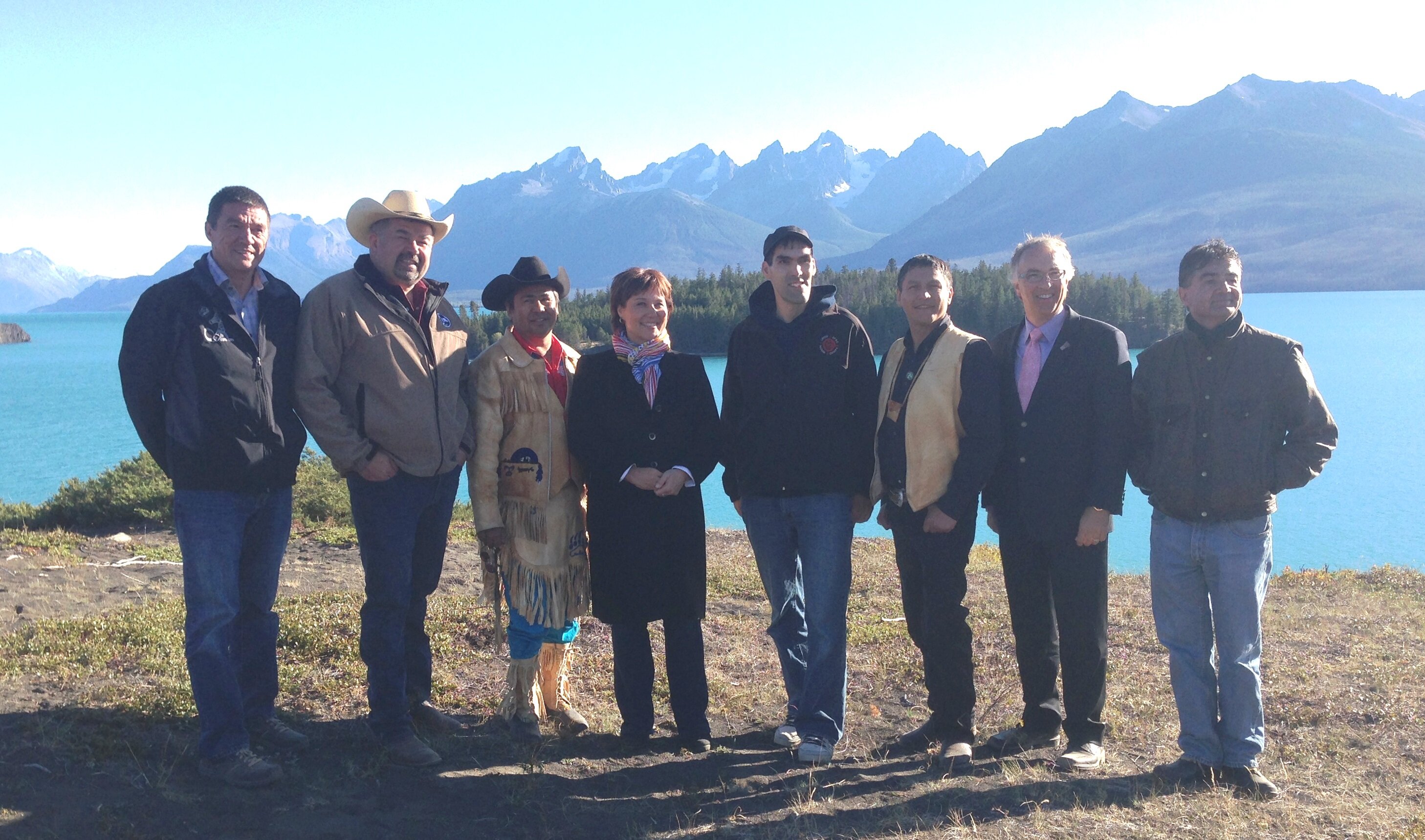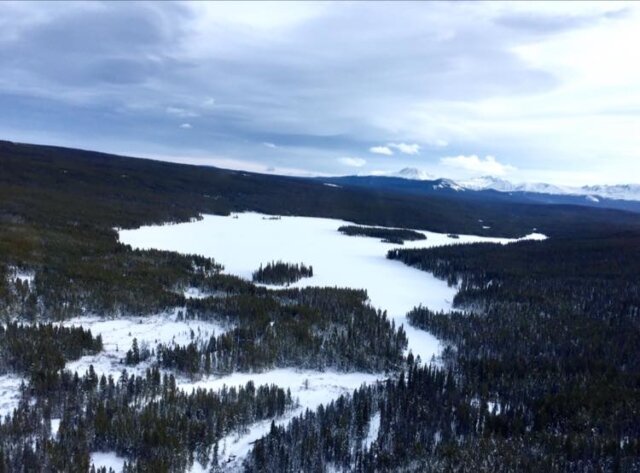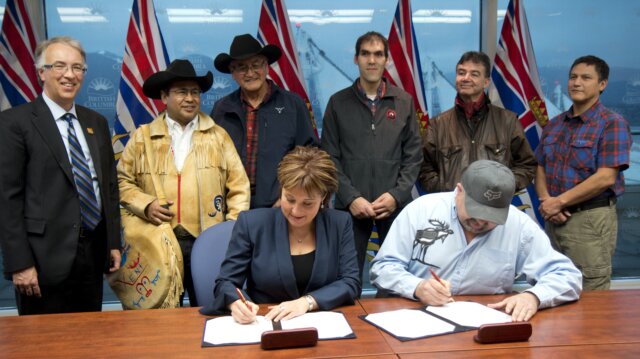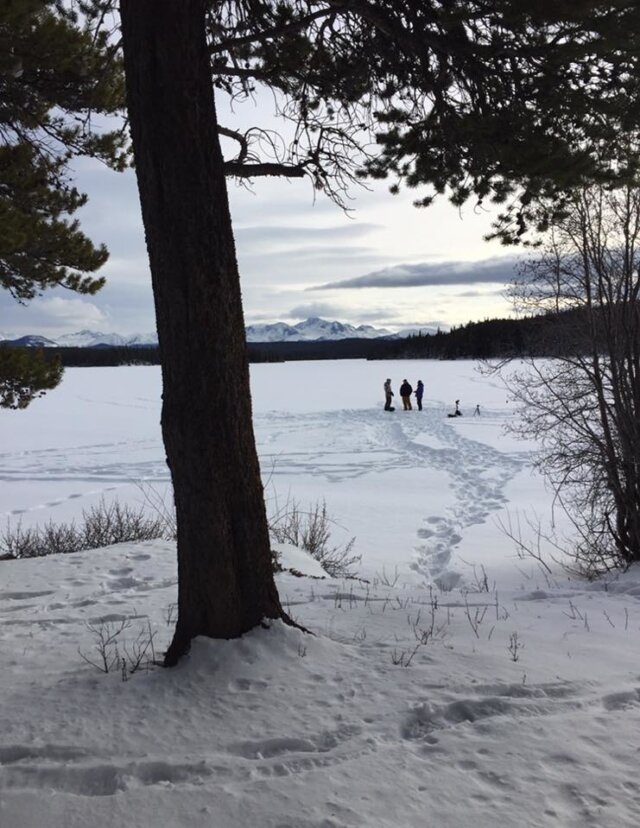Why the only First Nation in Canada to win an Aboriginal title claim is still fighting to protect their land
The Tsilhqot’in Nation is breaking new ground on Indigenous self-governance and land rights but claims a mining giant says those rights have gone too far

Chief Russell Myers-Ross says his favourite memory of Teztan Biny, or Fish Lake, is picking Labrador tea with his late mother.
He says the lake, located 125 kilometres west of Williams Lake in British Columbia’s central interior Cariboo region, is of significant cultural and environmental importance to Myers-Ross’s family and the Tsilhqot’in people.
“That whole area is considered a one-stop shop. You can get fish. You can hunt. You can do your trapping there,” says Myers-Ross. “My aunts and uncles, almost everyone spent their childhood there. They all have stories of it.”

Fish Lake has been at the centre of the Tsilhqot’in Nation’s decade-long fight to stop the “New Prosperity Mine” from being developed on their traditional territory. The copper and gold mine, which the company refers to as “one of Canada's largest undeveloped copper-gold projects,” has been rejected twice by the federal government. The reason? It would have significant effects on the environment and Tsilhqot’in rights.
The company behind the $1.5 billion proposal, Taseko Mines, is in court again, trying to get the federal rejection overruled. The Tsilhqot’in claim the company is arguing, among many other points, that the government went too far to protect Aboriginal land rights. The Tsilhqot’in are teaming up with the federal government to argue that they didn’t.
“For us it’s a real sore spot that we have to continue fighting this. We thought this issue was over. We thought we could put our energy into something different,” says Myers-Ross, who is an elected Chief and the Director of the Tsilhqot’in National Government, which represents six Tsilhqot’in communities that are at the forefront of Aboriginal land rights issues in Canada.
Only nation to make Aboriginal title claim
Discourse Media spent two months investigating First Nations land rights and governance issues, particularly where these issues clash with, or influence, resource development proposals. Our investigation focused on the Gitxsan Nation, who in 1997, along with the Wet’suwet’en, won the historic Delgamuukw land claims court case in the Supreme Court of Canada. That victory confirmed that Aboriginal title, or ownership of land, exists.
But even though the Gitxsan won their case, the courts still did not declare that they had Aboriginal title. The judge determined they would have to go back to court separately and seek a declaration of title. But the Gitxsan never did.

Years later, the Tsilhqot’in decided they could build off of what Delgamuukw started and went to court seeking a ruling that recognized their ownership of their traditional territory. In 2014, the Supreme Court of Canada affirmed the Tsilhqot’in's claim to Aboriginal title over more than 1,750 square kilometres of their territory. This gives the Tsilhqot’in the right to control, benefit from and choose how their land is developed. They are the first and only Indigenous group in Canadian history to be granted a declaration of Aboriginal title.
This, in part, led Christy Clark and the Minister of Aboriginal Relations and Reconciliation to sign the historic Nenqay Deni Accord (The People’s Accord) with the Tsilhqot’in Nation in February 2016. The accord outlines eight pillars of reconciliation to be negotiated over five years. These include: language and culture, children and families, justice, education and training, lands and resources and economic development.
“A key focus is going to be supporting new economic development for the Tsilhqot’in communities that also makes a positive contribution to the economies of the region and British Columbia,” Premier Clark said in a press release at the time of the signing.
However, it’s unclear what these promises will mean for resource development if the two sides disagree. An additional complication is that Fish Lake and the proposed location of the New Prosperity Mine falls inside Tsilhqot'in traditional territory but outside the boundaries of the land included in their Aboriginal title.
Myers-Ross says the declared title area only makes up 10 per cent of the Tsilhqot’in’s total claimed traditional territory. However, the courts also confirmed that the Tsilhqot’in have Aboriginal hunting and fishing rights to the area, which previous federal panel hearings concluded would be impacted by the mine. While these rights don’t equate to complete authority over Fish Lake as Aboriginal title would, they are still significant.
“Overall, we see the land issue as an unresolved issue,” says Myers-Ross. “This is still our land and we intend to continue being in that area.”
Uncharted waters
Roger William is Chief of the Xeni Gwet’in, one of the six Tsilhqot’in communities, and the plaintiff who led the Tsilhqot’in to their Supreme Court victory. William says their title case has shifted the business landscape, and that companies and government have to recognize First Nations as equal partners in shaping how and when resource development occurs.
“Unsound mining practices are not welcome in our territory. Our declaration of Aboriginal title in 2014 states that the land must be used in a manner that protects it for future generations. This is a principle that should be followed for all resource development in Canada,” says William.
Cynthia Callison is an Indigenous lawyer with expertise in constitutional law. She has been a lead negotiator in innovative agreements between Indigenous peoples, governments and resource developers. Callison says it’s in a company’s best interest to get consent from First Nations, even in situations where title is only claimed, but not proven.
“When First Nations assert Aboriginal title, the risk is so high that the Supreme Court of Canada [in the Tsilhqot’in decision] said the best way to have certainty is to obtain consent. So if people want to ignore that, then it’s at their own risk,” she says.
Amidst the ongoing discussion around reconciliation and land rights, in 2016, Taseko applied to the province for a permit to start exploratory drilling for the mine on Tsilhqot’in territory.

The decision on whether or not to grant the permit has not been made, but Myers-Ross says Tsilhqot’in leadership hasn’t been able to get a straight answer about where the B.C. government stands on the project. “We’ve brought this up with the Ministry [of Energy and Mines] and we never really got a good response,” he says.
Bill Bennett, B.C.’s Minister of Energy and Mines, wrote in an email that “the minister does not approve permits under the Mines Act. That approval comes after consultation with potentially affected parties like the Tsilhqot’in and an assessment of all other factors, including the environment and communities.”
But Myers-Ross believes that the provincial government is pushing to approve the project. “They suggested this is up to the statutory decision makers and that they don’t have full say on how this goes. But we understand that in the last two rounds of the proposals that the B.C. Liberal government, or a lot of its ministers, were very active in trying to promote this mine.”
When asked about championing the project, Minister Bennett wrote, “while our government does believe that new mines are an important part of our Jobs Plan and are essential to rural communities particularly, and while mining actually employs more First Nations people in Canada than any other industry, the perspective of the Tsilhqot’in is very important to our government.”
Taseko Mines did not respond to a request for comment.
High costs limit Aboriginal title cases
Almost three years since their historic court victory, the Tsilhqot’in are slowly taking control over all aspects of self-governance. Through a framework established in the Nenqay Deni Accord, non-title traditional lands are currently being negotiated between the Tsilhqot’in and the B.C. government. The Tsilhqot’in have also recently signed a letter of understanding with the federal government to begin the same process.
“They have to negotiate the implementation of title. So even though there’s a declaration that title existed, they have to negotiate the interpretation and application of title on those lands,” says Callison.
“I think it must be difficult for them,” she adds. “Because they still have to get the agreement of the provincial government in order to implement title. And really that’s the political whim of the provincial government, what they can negotiate.”
Callison says it’s unlikely that other First Nations will successfully litigate for title any time soon, and that that’s to the strategic advantage of the provincial government.
"The provincial government is relying upon the fact that First Nations do not have the time or money to bring title cases."
“Most First Nations cannot afford to bring a title case. It’s like ten years and $10 million. And the provincial government is relying upon the fact that First Nations do not have the time or money to bring title cases,” she says. “They get to continue to unilaterally issue permits and licenses for land development and resource extraction.”
But being the only nation in Canada with proven title, the Tsilhqot’in, says Myers-Ross, will continue fighting against the mining project proposed for their territories even as the their people struggle with economic development.
“You look around and in the community you still see housing needs that are in desperate conditions. You see an economy where we’re not self-sustaining. So there’s challenges that still lie ahead.”
Despite the economic challenges of the area, Myers-Ross says the 550 direct jobs promised to come with the New Prosperity Mine are not worth the project’s environmental and cultural impact to Fish Lake. After initial stages of economic development planning and community consultations, Myers-Ross says his people want to see the area around Fish Lake preserved for future cultural, environmental and sustainable economic purposes.
“The biggest priority from my community was cultural tourism, and trying to figure out ways to get people into showcasing the lands that we have,” he says. “For the most part, it hasn’t had a lot of human activity in the area. I can’t really fully describe it. It’s a beautiful place. And we want to keep it that way.”
